(完整word版)初中英语词汇中常见的构词法
- 格式:doc
- 大小:50.51 KB
- 文档页数:5
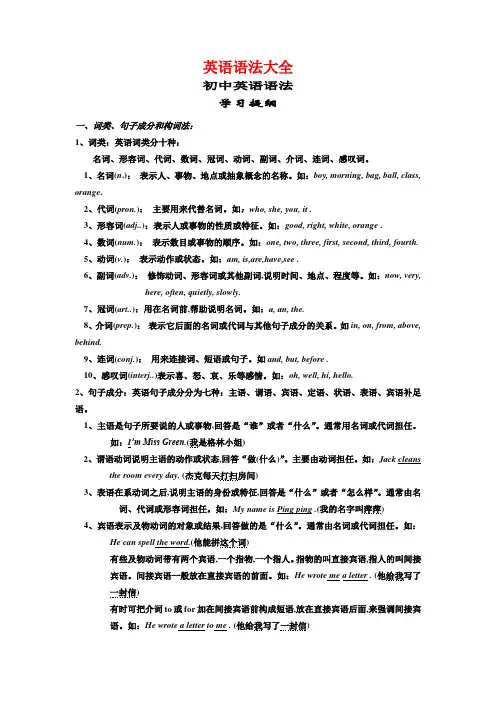
英语语法大全初中英语语法学习提纲一、词类、句子成分和构词法:1、词类:英语词类分十种:名词、形容词、代词、数词、冠词、动词、副词、介词、连词、感叹词。
1、名词(n.):表示人、事物、地点或抽象概念的名称。
如:boy, morning, bag, ball, class, orange.2、代词(pron.):主要用来代替名词。
如:who, she, you, it .3、形容词(adj..):表示人或事物的性质或特征。
如:good, right, white, orange .4、数词(num.):表示数目或事物的顺序。
如:one, two, three, first, second, third, fourth.5、动词(v.):表示动作或状态。
如:am, is,are,have,see .6、副词(adv.):修饰动词、形容词或其他副词,说明时间、地点、程度等。
如:now, very,here, often, quietly, slowly.7、冠词(art..):用在名词前,帮助说明名词。
如:a, an, the.8、介词(prep.):表示它后面的名词或代词与其他句子成分的关系。
如in, on, from, above, behind.9、连词(conj.):用来连接词、短语或句子。
如and, but, before .10、感叹词(interj..)表示喜、怒、哀、乐等感情。
如:oh, well, hi, hello.2、句子成分:英语句子成分分为七种:主语、谓语、宾语、定语、状语、表语、宾语补足语。
1、主语是句子所要说的人或事物,回答是“谁”或者“什么”。
通常用名词或代词担任。
如:I’m Miss Green.(我是格林小姐)2、谓语动词说明主语的动作或状态,回答“做(什么)”。
主要由动词担任。
如:Jack cleansthe room every day. (杰克每天打扫房间)3、表语在系动词之后,说明主语的身份或特征,回答是“什么”或者“怎么样”。
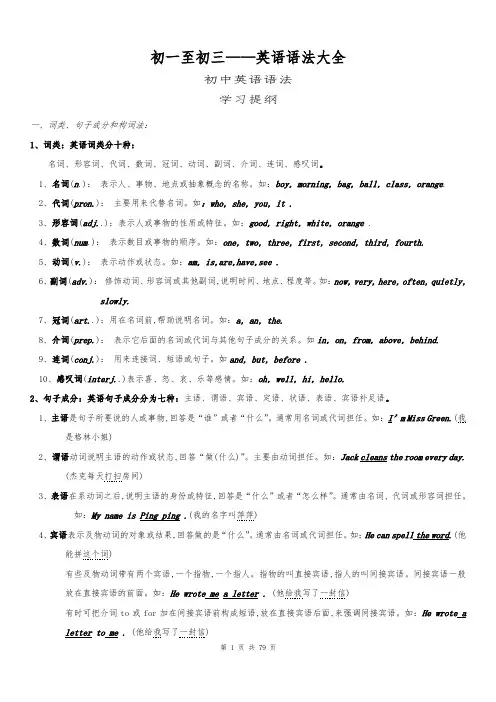
初一至初三——英语语法大全初中英语语法学习提纲一、词类、句子成分和构词法:1、词类:英语词类分十种:名词、形容词、代词、数词、冠词、动词、副词、介词、连词、感叹词。
1、名词(n.):表示人、事物、地点或抽象概念的名称。
如:boy, morning, bag, ball, class, orange.2、代词(pron.):主要用来代替名词。
如:who, she, you, it .3、形容词(adj..):表示人或事物的性质或特征。
如:good, right, white, orange .4、数词(num.):表示数目或事物的顺序。
如:one, two, three, first, second, third, fourth.5、动词(v.):表示动作或状态。
如:am, is,are,have,see .6、副词(adv.):修饰动词、形容词或其他副词,说明时间、地点、程度等。
如:now, very, here, often, quietly,slowly.7、冠词(art..):用在名词前,帮助说明名词。
如:a, an, the.8、介词(prep.):表示它后面的名词或代词与其他句子成分的关系。
如in, on, from, above, behind.9、连词(conj.):用来连接词、短语或句子。
如and, but, before .10、感叹词(interj..)表示喜、怒、哀、乐等感情。
如:oh, well, hi, hello.2、句子成分:英语句子成分分为七种:主语、谓语、宾语、定语、状语、表语、宾语补足语。
1、主语是句子所要说的人或事物,回答是“谁”或者“什么”。
通常用名词或代词担任。
如:I’m Miss Green.(我是格林小姐)2、谓语动词说明主语的动作或状态,回答“做(什么)”。
主要由动词担任。
如:Jack cleans the room every day.(杰克每天打扫房间)3、表语在系动词之后,说明主语的身份或特征,回答是“什么”或者“怎么样”。
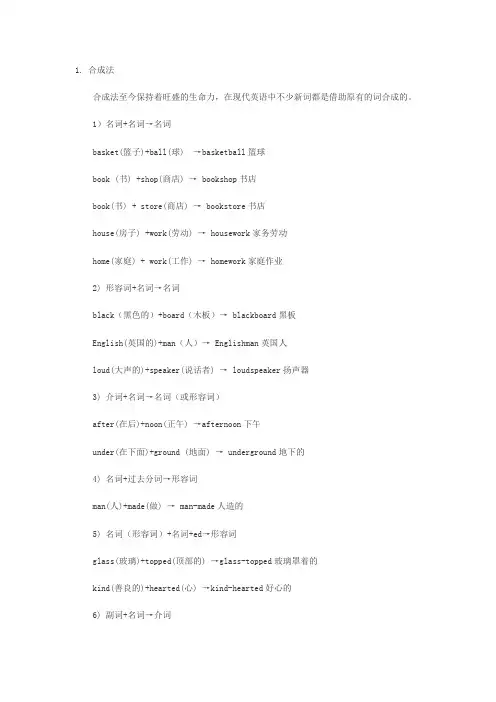
1. 合成法合成法至今保持着旺盛的生命力,在现代英语中不少新词都是借助原有的词合成的。
1)名词+名词→名词basket(篮子)+ball(球) →basketball篮球book (书) +shop(商店) → bookshop书店book(书) + store(商店) → bookstore书店house(房子) +work(劳动) → housework家务劳动home(家庭) + work(工作) → homework家庭作业2) 形容词+名词→名词black(黑色的)+board(木板)→ blackboard黑板English(英国的)+man(人)→ Englishman英国人loud(大声的)+speaker(说话者) → loudspeaker扬声器3) 介词+名词→名词(或形容词)after(在后)+noon(正午) →afternoon下午under(在下面)+ground (地面) → underground地下的4) 名词+过去分词→形容词man(人)+made(做) → man-made人造的5) 名词(形容词)+名词+ed→形容词glass(玻璃)+topped(顶部的) →glass-topped玻璃罩着的kind(善良的)+hearted(心) →kind-hearted好心的6) 副词+名词→介词in(里面)+side(边) →inside在内down(在下)+stairs(楼梯) →downstairs在楼下2. 派生法派生法是通过在词根上加后缀或前缀构成新词。
它不仅扩充了英语词汇,而且丰富了语言的表现力。
后缀(后缀多数改变词性而不改变词义):1)动词或形容词+er/or →名词write v.写→writer n.作者travel v. 旅行→traveler n.旅客foreign adj.外国的→foreigner n.外国人invent v.发明→inventor n.发明家visit v. 参观→ visitor n.参观者2) 动词 +(t)ion/sion →名词invent v.发明→invention n.发明operate v.做手术→operation n.手术decide v.决定→ decision决定attend v. 注意/参加→ attention注意3) 动词+ing/ed →名词或形容词build v. 建筑→building n.建筑物interest v.使感兴趣→interesting/interested adj.有趣的please v.使高兴→pleased adj.高兴的exciting 兴奋的 excited4) 名词+ese →名词和形容词China n.中国→Chinese n.中国人 adj.汉语的Japan n. 日本→Japanese n. 日本人 adj.日语的5) 名词或动词+ ful →形容词help n. 帮助→helpful adj有帮助的use n. 使用→ useful adj. 有用的6)名词或动词+less →形容词Useless 无用的Helpless 无助的Colorless 无色的苍白的6) 动词 +able →形容词→enjoy v. 喜欢→enjoyable. adj.有趣的forget v. 忘记→ forgettable adj. 容易被忘的7) 名词 +en →形容词wool n. 羊毛→woolen adj.羊毛的wood n. 木材→wooden adj.木制的8) 名词 +y →形容词sun n. 太阳→sunny adj.阳光灿烂的cloud n. 云→ cloudy adj.多云的luck n. 运气→ lucky adj.运气好的noise n. 响声→noisy adj.喧闹的smell n. 味道,气味→smelly adj. 有使人难受的气味的,臭的9)形容词 +ly →副词happy adj 高兴的→happily adv. 高兴地wide adj. 宽广的→widely adv. 宽广地10) 形容词 +ness →名词good adj. 好的→goodness n.好意kind adj. 善良的→kindness n.和蔼happy adj. 开心的→happiness n. 开心11) 名词 +ly →形容词friend n. 朋友→friendly adj.友好的love n. 爱→lovely adj.可爱的12) 名词 + less →形容词(词义与加ful相反)care + less →careless adj. 粗心的help + less →helpless adj. 无助的13) 名词 + al →形容词nation n.民族→national adj. 国家的education n.教育→educational adj.教育性的tradition n. 传统→traditional adj. 传统的14) 名词 + ist →名词science n.科学→scientist n.科学家piano n.钢琴→pianist n.钢琴家tour n. 旅游,观光旅行→tourist n. 旅行者,观光客15) 动词 + ment →名词develop v.发展→development n.发展agree v.同意→agreement n. 同意,一致, 协议argue v. 争论,辩论→argument n. 争吵;论据16) 形容词 + ity →名词able adj. 能够的→ability n.能力,才能possible adj.可能的→possibility n. 可能性real adj. 真的,真实的→reality n. 现实,实际,真实17) 名词 +ous →形容词danger n.危险→dangerous adj.危险的18) 名词 +ish →形容词fool n. 愚人,傻瓜→foolish adj.愚蠢的,傻的child n.孩子→childish adj.孩子气的,幼稚的book n. 书→bookish adj.书生气的19) 形容词或名词 +en →动词wide adj. 广泛的,宽阔的→widen v. 弄宽sharp adj. 锋利的,急剧的→sharpen v. 使...尖锐,变为锐利 fright n. 惊吓→frighten v. 使惊吓, 害怕,惊恐20) 名词或形容词 +ify →动词beauty n.美丽→beautify v. 美化,变美,修饰simple adj.简单的→simplify v. 简化,使单纯21) 形容词 +ize →动词real adj. 真的,真实的→realize v.了解, 实现, 察觉;领悟memory n.记忆力→memorize v.记忆22) 动词 +tive →形容词act v. 行为,行动→active adj. 积极的,主动的attract v. 吸引,有吸引力→attractive adj. 有吸引力的,引起注意的23)动词 +ess →名词(女性)host v.主持,做东→hostess n. 女主人act v. 行动,扮演→actress n. 女演员wait v.等待,等候→waitress n. 女侍者,女服务员前缀(前缀一般只改变词的意思而不改变其词性):1) un- (不,非,表示否定,形容词前缀)happy (高兴的) → unhappy(不高兴的)like (像) → unlike(不像)2) im- (不,无,非,表示否定,形容词前缀,常用在p, b, m开头的单词前) possible (可能的) → impossible(不可能的)polite → impolite3) in- (不,无,非,表示否定,形容词前缀)active →inactivecomplete →incomplete 不完全的4) dis-(不,非,表示否定,动词或形容词或名词前缀) honest →dishonestagree →disagreeadvantage优势→disadvantage不利,不利条件5) mis- (表示错误)understand →misunderstand (误解)mistake (错误), misuse (误用)6) re- (再,重复)tell 叙述→ retell复述build 建筑→ rebuild 重建write →rewrite7) bi- (两个、双边的)bicycle 自行车, bicolor 双色的8) inter- (相互、交互、在一起)interview, international, internet9) tele- (远)telephone, television10) kilo- (千)meter 米→kilometer 公里,千米gram 克→kilogram 千克11) micro- (微,小)microwave oven 微波炉microcomputer 微型电脑12) sub- (下,次,亚,准,副)subway 地铁,sub-zero 零度以下的,subcollege 准大学程度的,subworker 助手,副手,suboffice 分办事处,3. 转化法在英语发展过程中,由于词尾的基本消失,衍生出一种新的构词法——转化法,而无须借助词缀,就实现词类的转化。
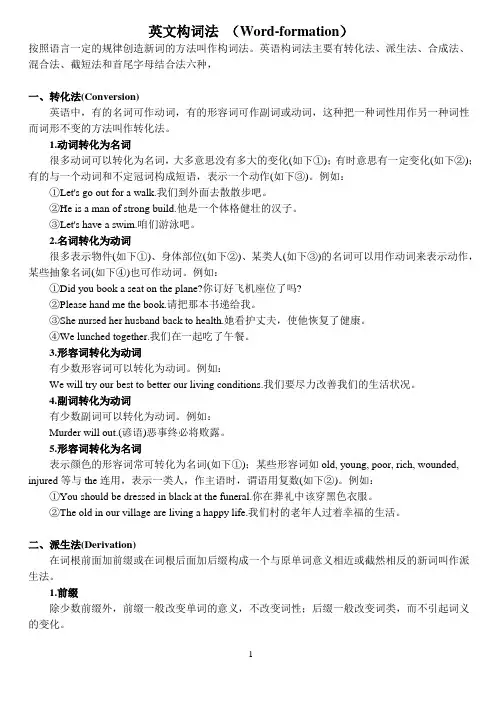
英文构词法(Word-formation)按照语言一定的规律创造新词的方法叫作构词法。
英语构词法主要有转化法、派生法、合成法、混合法、截短法和首尾字母结合法六种,一、转化法(Conversion)英语中,有的名词可作动词,有的形容词可作副词或动词,这种把一种词性用作另一种词性而词形不变的方法叫作转化法。
1.动词转化为名词很多动词可以转化为名词,大多意思没有多大的变化(如下①);有时意思有一定变化(如下②);有的与一个动词和不定冠词构成短语,表示一个动作(如下③)。
例如:①Let's go out for a walk.我们到外面去散散步吧。
②He is a man of strong build.他是一个体格健壮的汉子。
③Let's have a swim.咱们游泳吧。
2.名词转化为动词很多表示物件(如下①)、身体部位(如下②)、某类人(如下③)的名词可以用作动词来表示动作,某些抽象名词(如下④)也可作动词。
例如:①Did you book a seat on the plane?你订好飞机座位了吗?②Please hand me the book.请把那本书递给我。
③She nursed her husband back to health.她看护丈夫,使他恢复了健康。
④We lunched together.我们在一起吃了午餐。
3.形容词转化为动词有少数形容词可以转化为动词。
例如:We will try our best to better our living conditions.我们要尽力改善我们的生活状况。
4.副词转化为动词有少数副词可以转化为动词。
例如:Murder will out.(谚语)恶事终必将败露。
5.形容词转化为名词表示颜色的形容词常可转化为名词(如下①);某些形容词如old, young, poor, rich, wounded, injured等与the连用,表示一类人,作主语时,谓语用复数(如下②)。

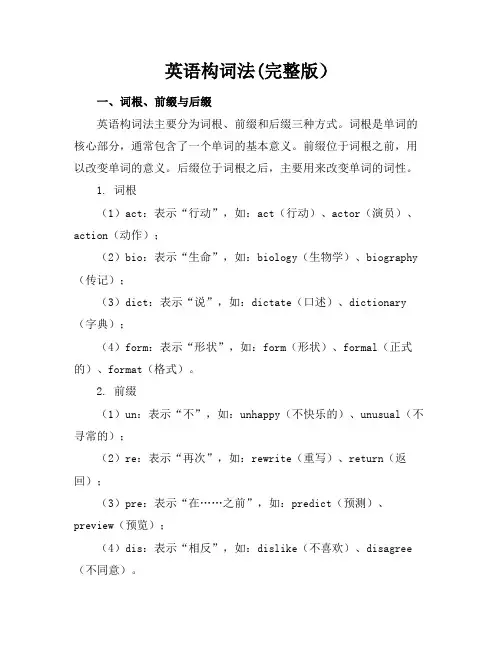
英语构词法(完整版)一、词根、前缀与后缀英语构词法主要分为词根、前缀和后缀三种方式。
词根是单词的核心部分,通常包含了一个单词的基本意义。
前缀位于词根之前,用以改变单词的意义。
后缀位于词根之后,主要用来改变单词的词性。
1. 词根(1)act:表示“行动”,如:act(行动)、actor(演员)、action(动作);(2)bio:表示“生命”,如:biology(生物学)、biography (传记);(3)dict:表示“说”,如:dictate(口述)、dictionary (字典);(4)form:表示“形状”,如:form(形状)、formal(正式的)、format(格式)。
2. 前缀(1)un:表示“不”,如:unhappy(不快乐的)、unusual(不寻常的);(2)re:表示“再次”,如:rewrite(重写)、return(返回);(3)pre:表示“在……之前”,如:predict(预测)、preview(预览);(4)dis:表示“相反”,如:dislike(不喜欢)、disagree (不同意)。
3. 后缀(1)ness:表示“状态”,如:happiness(幸福)、sadness (悲伤);(2)ful:表示“充满”,如:hopeful(充满希望的)、careful(小心翼翼的);(3)ly:表示“副词”,如:quickly(迅速地)、slowly(慢慢地);(4)tion:表示“动作、状态”,如:action(动作)、invention(发明)。
二、合成法与派生法在英语构词法中,除了词根、前缀和后缀,还有合成法和派生法两种重要的构词方式。
这些方法丰富了英语词汇,使得表达更加精确和多样。
1. 合成法(1)名词+名词:如:snowfall(降雪)、bookstore(书店);(2)名词+形容词:如:worldwide(全世界的)、citywide(全市的);(3)形容词+形容词:如:darkblue(深蓝色的)、lightgreen (浅绿色的);(4)动词+副词:如:lookup(查阅)、takeover(接管)。

英语基本构词法英语最基本的构词法(word formation)有三种:派生(derivation)、合成(compounding)和转化(conversion)。
利用构词法记忆单词,可以记忆成串,举一反三。
Ⅰ。
派生法派生词缀和词根结合,或者粘着词根和粘着词根结合构成单词的方法,叫做派生法(derivation),也称作缀词法。
用派生法构成的词叫做派生词(derivative).派生词的词缀法是英语构词法中最活跃的一种,在英语构词的历史上发挥极其重要的作用。
另外,这种构词法也是我们可以发挥能动性借以扩大词汇量的一种构词法。
词缀分为前缀和后缀两种。
A.前缀1.表示“否定”、“相反”意义的前缀:de— decrease减少;decentralize分散;degrade降级,降低……的地位;dis- dislike不喜欢;disagree不同意;distrust不信任;disappear消失;il— illegal不合法的;illogical不合逻辑的;illegalize宣布……为非法;im— impossible不可能的;immoral不道德的;impractical不现实的;un- unwilling 不情愿的; unbelievable 难以置信的;unnecessary 不必要的等等。
2.表示时间先后的前缀ex— ex-husband前夫;ex-president前总统;fore- foretell语言;foresight先见之明,预见;foresee预见,预知;mid— midterm其中的;midnight午夜;post— postwar战后的;postgraduate研究生;postdoctoral博士后的等等。
3.表示方向位置的前缀ex- export出口;exclude把……排斥在外;external外部的;in— input输入;indoor室内的;inrush涌入;incoming进来的等等.4.表示程度的前缀extra- extraordinary非凡的,惊人的;extracurricular课程以外的;out— outnumber比……多;outrun超过,跑得比……快;sur- surpass超过,优于;surplus剩余的;surrealism超现实主义等等.5.表示数量的前缀bi- bilateral双边的,两边的;bipartisan两党的;bilingual两语的;mono— momocycle独轮车;monologue独白;monodrama独角戏,单人剧;poly- polyacid多酸的;polyclinic多科联合诊所;polycentric多中心的等等。
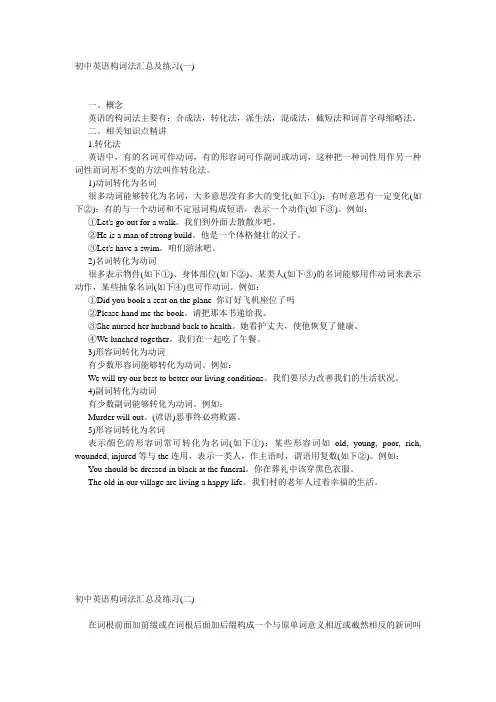
初中英语构词法汇总及练习(一)一。
概念英语的构词法主要有:合成法,转化法,派生法,混成法,截短法和词首字母缩略法。
二。
相关知识点精讲1.转化法英语中,有的名词可作动词,有的形容词可作副词或动词,这种把一种词性用作另一种词性而词形不变的方法叫作转化法。
1)动词转化为名词很多动词能够转化为名词,大多意思没有多大的变化(如下①);有时意思有一定变化(如下②);有的与一个动词和不定冠词构成短语,表示一个动作(如下③)。
例如:①Let's go out for a walk。
我们到外面去散散步吧。
②He is a man of strong build。
他是一个体格健壮的汉子。
③Let's have a swim。
咱们游泳吧。
2)名词转化为动词很多表示物件(如下①)、身体部位(如下②)、某类人(如下③)的名词能够用作动词来表示动作,某些抽象名词(如下④)也可作动词。
例如:①Did you book a seat on the plane 你订好飞机座位了吗②Please hand me the book。
请把那本书递给我。
③She nursed her husband back to health。
她看护丈夫,使他恢复了健康。
④We lunched together。
我们在一起吃了午餐。
3)形容词转化为动词有少数形容词能够转化为动词。
例如:We will try our best to better our living conditions。
我们要尽力改善我们的生活状况。
4)副词转化为动词有少数副词能够转化为动词。
例如:Murder will out。
(谚语)恶事终必将败露。
5)形容词转化为名词表示颜色的形容词常可转化为名词(如下①);某些形容词如old, young, poor, rich, wounded, injured等与the连用,表示一类人,作主语时,谓语用复数(如下②)。
例如:You should be dressed in black at the funeral。
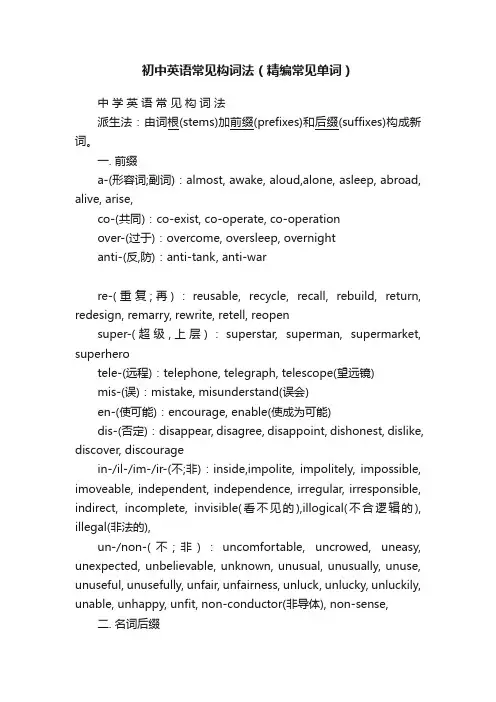
初中英语常见构词法(精编常见单词)中学英语常见构词法派生法:由词根(stems)加前缀(prefixes)和后缀(suffixes)构成新词。
一. 前缀a-(形容词;副词):almost, awake, aloud,alone, asleep, abroad, alive, arise,co-(共同):co-exist, co-operate, co-operationover-(过于):overcome, oversleep, overnightanti-(反,防):anti-tank, anti-warre-(重复;再):reusable, recycle, recall, rebuild, return, redesign, remarry, rewrite, retell, reopensuper-(超级,上层):superstar, superman, supermarket, superherotele-(远程):telephone, telegraph, telescope(望远镜)mis-(误):mistake, misunderstand(误会)en-(使可能):encourage, enable(使成为可能)dis-(否定):disappear, disagree, disappoint, dishonest, dislike, discover, discouragein-/il-/im-/ir-(不;非):inside,impolite, impolitely, impossible, imoveable, independent, independence, irregular, irresponsible, indirect, incomplete, invisible(看不见的),illogical(不合逻辑的), illegal(非法的),un-/non-(不;非):uncomfortable, uncrowed, uneasy, unexpected, unbelievable, unknown, unusual, unusually, unuse, unuseful, unusefully, unfair, unfairness, unluck, unlucky, unluckily, unable, unhappy, unfit, non-conductor(非导体), non-sense,二. 名词后缀-er(…者):customer, leader, manager, officer, partner, ruler, stranger, climber, keeper, maker, owner, banker, reporter, teenager, winner, foreigner, thinker, swimmer, traveller, worker, teacher, reader, listener, speaker, cleaner, helper, waiter, player, singer, dancer, driver, writer, runner, beginner, passenger, lover, skier, murderer, learner, printer, researcher, Londoner, New Yorker -or(器具;…者):actor, competitor, visitor, professor, doctor, director, collector, instructor(教员)备注一:通常加“-er/-or ”多为“男性”,加“-ess”多为“女性”waiter男招待, waitress女服务员, actor男演员, actress女演员, lawyer律师, lawyeress女律师, prince王子, princess 公主备注二:从主动,被动上来看,加“-er\-or”为主动,加“-ee ”为被动examiner 主考人,监考员 examinee 参加考试者,受试人(被监考者) employer 雇主(雇佣别人) employee雇员(被雇佣)interviewer会见者 interviewee 被接见者,被访问者-ese(…地方的人):Chinese, Japanese-ian(精通…的人;…地方的人):musician, magician, historian, physician, technician-ist(专业人员):artist, pianist, tourist, terrorist, physicist, scientist, socialist, journalist(新闻记者), dentist, instrumentalist -ment(性质;状态):government, instrument, achievement, amusement, excitement, improvement, movement, argument, development, agreement-ion:discussion, expression, decision-dom(…范围):freedom, kingdom-ness(性质;状态):business, happiness, shyness, illness, kindness, carelessness, sickness, fairness, unfairness, godness, hardness, forgetfulness, darkness-ship:friendship, relationship, leadership, hardship(困苦)-tion(动作;过程;结果):pollution, suggestion, invention, action, examination, graduation, pronunciation, communication, competition, conversation, satisfaction, education, organization, location, protection, relation, preparation, resolution, collection, operation, impression-hood(…关系,…状况):childhood, neighborhood, brotherhood, sisterhood-th(某种状况或性质):growth, warmth, truth, death, health, length, strength-ty(…性):safety, activity-ce(…性):importance, difference, confidence, dependence, independence, silence, performance-boy, -girl, -man, -woman(表示人的词来构词):cowboy牛仔, playboy花花公子, salesgirl女店员, salesperson 推销员, workman产业工人, postman邮递员, workwomen劳动妇女三. 形容词后缀-t:important, different, confident, dependent, independent, silent-al:international, educational, national, historical, medical, musical, professional, social, typical, normal, personal, physical, traditional, accidental, central, environmental, general -an:American, European, Canadian, Italian, Australian, Indian-ern:southern, northern, eastern, western, modern-ful:helpful, harmful, painful, thankful, peaceful, successful, truthful, awful, cheerful, grateful, useful, careful, wonderful, forgetful, hopeful, colorful, beautiful-ary:secondary, imaginary-able/ible:reasonable, horrible, believable, unbelievable, mobile, valuable, disable, available, comfortable, terrible,possible, impossible, enjoyable, moveable, imoveable, workable, countable, uncountable, eatable-ish:foolish, childish, swedish(瑞典的), British, English-ive:active, creative, native, expensive-y:windy, sunny, cloudy, rainy, wealthy, dirty, sleepy, healthy, hairy, icy, noisy, foggy-less:careless, homeless, meaningless, useless, colorless, helpless, hopeless, motherless-ous:serious, humorous, famous, dangerous, courageous, continuous-tic:scientific, fantastic-en:wooden, fallen, golden-ing(修饰物):interesting, exciting, boring, tiring, surprising -ed(修饰人):interested, excited, bored, tired, surprised四. 动词、副词和数词后缀-fy(使…化):simplify, beautify, satisfy, electrify-en(使…变得):strengthen, lengthen, widen, fatten, blacken, thicken, quicken, harden, soften, weaken-ize(使…成为):realize (实现), modernize, organize-ly(方式;程度):freely, exactly, lastly, normally, politely, impolitely, wisely, actually, specially, especially, heavily, mostly, recently, simply, suddenly, beautifully, cheaply, clearly, comfortably, finally, loudly, probably, quietly, quickly, seriously, weekly, badly, terribly, perfectly, truly, angrily, carefully, hardly, completely, slowly, kindly, nearly, really, usually, happily, easily -ward(s)(方向):towards, backward, eastward, forward-teen(十):fourteen, fifteen, eighteen-ty(整十位数):twenty, forty, thirty-th(序数词):twelfth, fifth, eighth, ninth, twentieth五. 截短法:单词缩写,词义和词性保持不变的英语构词法称为截短法,主要有截头,去尾,截头去尾等形式。
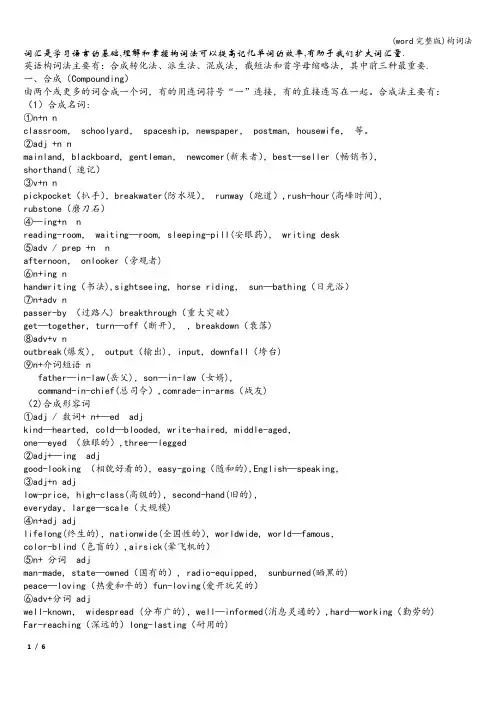
词汇是学习语言的基础,理解和掌握构词法可以提高记忆单词的效率,有助于我们扩大词汇量.英语构词法主要有:合成转化法、派生法、混成法,截短法和首字母缩略法,其中前三种最重要.一、合成(Compounding)由两个或更多的词合成一个词,有的用连词符号“一”连接,有的直接连写在一起。
合成法主要有:(1)合成名词:①n+n nclassroom, schoolyard, spaceship, newspaper, postman, housewife,等。
②adj +n nmainland, blackboard, gentleman, newcomer(新来者),best—seller(畅销书),shorthand( 速记)③v+n npickpocket(扒手),breakwater(防水堤), runway(跑道),rush-hour(高峰时间),rubstone(磨刀石)④—ing+n nreading-room, waiting—room, sleeping-pill(安眼药), writing desk⑤adv / prep +n nafternoon, onlooker(旁观者)⑥n+ing nhandwriting(书法),sightseeing, horse riding, sun—bathing(日光浴)⑦n+adv npasser-by (过路人) breakthrough(重大突破)get—together, turn—off(断开),,breakdown(衰落)⑧adv+v noutbreak(爆发), output(输出),input, downfall(垮台)⑨n+介词短语 nfather—in-law(岳父),son—in-law(女婿),command-in-chief(总司令),comrade-in-arms(战友)(2)合成形容词①adj / 数词+ n+—ed adjkind—hearted, cold—blooded, write-haired, middle-aged,one—eyed (独眼的),three—legged②adj+—ing adjgood-looking (相貌好看的),easy-going(随和的),English—speaking,③adj+n adjlow-price, high-class(高级的),second-hand(旧的),everyday,large—scale(大规模)④n+adj adjlifelong(终生的),nationwide(全国性的),worldwide, world—famous,color-blind(色盲的),airsick(晕飞机的)⑤n+ 分词 adjman-made, state—owned(国有的), radio-equipped, sunburned(晒黑的)peace—loving(热爱和平的)fun-loving(爱开玩笑的)⑥adv+分词 adjwell-known, widespread (分布广的),well—informed(消息灵通的),hard—working(勤劳的) Far-reaching(深远的)long-lasting(耐用的)(3)合成动词①adv +v voverthrow(推翻),undergo(经历),uphold(高举), overhear(无意),output(输出),input,②n+v vsleep-walk(梦游),daydream(做白日梦),spoonfeed(填鸭式灌输),sun—bathe, mess—produce(大规模生产)③adj+v vwhitewash(粉刷),blacklist(列入黑名单),dry—salt(干腌), deep-freeze(冷藏)(4)合成副词①adv+adv advhowever, whenever, moreover(而且), therefore,②adj+adv adveverywhere, nowhere, somewhere, anywhere,③n+adv advheadfirst(头朝下),daylong(整天),nightlong(通宵)④adv+n advdownstairs, upstairs, downhill, inside, westward, upward,(5)合成代词some, any, every, no 可与 -thing –one, -body 合成代词,代词宾格(物主代词)+self(selves): something, everything, anyone nobody, yourselves, himself,二、转化( conversion )由一种词类转化成另一种或几种词类1.n advLet‘s go hand in hand。

初中英语构词法基本知识讲解在英语中,一个单词往往与耳它词在结构上有联系!把S些联系的规律总结出来就是构词法°构词刖方法主婪有派生、转化和合成等三种.泯生袪在一个单词前或词尾加上一个词蟹,从而变成一个新词的方袪叫做派生法.加在单词前的词銀叫前囊,加在单词后的词蠶呱后織.1.靴法是指基本不改变单帥词形,而額转用为另—词类讯单词转化后艙义常与械前的意义有密切的联氟May I have a look ?拢可以看-看吗?(动词转化为名诩Let him have a try.让他试试.(动词转化为名词)Can we book the tickets ahead?我们能探前定票吗?(名词转化炯诩The hall can seat thousands of people.大斤能坐数千人.(名词转化为动词)She had to busy herself with housevoik.她不得不忙于冢务活。
(形容词转化成动词)lou d better eiopty the bottle first.你最好把瓶子先倒空.(名词转化九动词)It' $ necessary to know the difference between ght and vzong.有必娶知道对错之间时区别。
(形容词转化戚名词)They often help the poor.他们经常帮助穷人。
(形容词转化成名词)Ve began to drive jjoith.我们刑冶向北行驶.(名词转化成副词)There veie lots of ups and dovns in his life.他的一生中有许多的起起落落。
(副词轉化成名词)合成袪把两个或两个以上的单词合成为一个单词,这种构词法咸为合成?1.令成形容词He is a Khdte~collai clerk.他是一名白领职员.He is an open^mded leader.他是—名思想刑I的领导<■Wiat a Jcijid-hearted girl!多么好心册女孩!This is a good-loahng a table.这是一张好看的桌子-Taking a taxi is tijsesavin^.乘坐出租车很省时。
初中英语新课标语法项目十三、构词法word-formation英语构词法主要有四种:合成法、派生法、转化法和缩略法。
Ⅰ.合成法Compounding把两个或两个以上的单词组成一个新词的方法叫合成法。
合成词有三种书写方式:Solid 紧密式bedroomHyphenated 连字符式first-aid 急救的Open 敞开式pen pal1.合成名词名词+名词notebook, bookstore, table tennis, newspaper, sunglasses, weekend, weekday名词+动词headache, toothache动词+名词playground, pickpocket 扒手, breakfast (break 中断+fast 节食“停止夜间的节食”,即早餐)形容词+名词blackboard, green onion, grandson副词+名词outbreak. (战争的)爆发;(疾病的)发作, byway 小道, overcoat 大衣, underclothes 内衣副词+动词output 输出;产量, input输入, income 收入, outcome 成果, outlook 景色;观点, upstart 暴发户动词+副词breakdown 崩溃;衰弱, set-up 组织;结构, farewell 再会, feedback 反馈名词+-ing sightseeing观光, mountain climbing 登山, ice skating, handwriting 笔迹, stamp-collecting 集邮-ing+名词drinking water 饮用水, waiting-room候车室;候诊室, sitting room / living room 起居室;客厅washing machine 洗衣机其他seesaw 跷跷板, merry-go-round. 旋转木马, mother-in-law 婆母;岳母, comrade in arms 战友, forget-me-not [植物]毋忘草, hide-and-seek 捉迷藏2.合成形容词形容词+名词short-term 短期的, long-term名词+形容词sunburned晒黑的, snow-white 雪白的¸ life-long 终生的, carefree 无忧无虑的, worldwide 世界范围的, skin-deep 肤浅的;表面的, seasick 晕船的,形容词+形容词bittersweet 苦乐参半的, red-hot 炽热的, blue-black 深蓝色的名词+现在分词peace-loving 爱好和平的名词+过去分词man-made 人造的, bed-ridden .卧床不起的, heartbroken 伤心的介词+名词underwater 水下的, underground 地下的, undersea 海面下的形容词或副词+-ing或过去分词good-looking 好看的, easygoing, kind-hearted 好心的, narrow-minded 心胸狭窄的, outgoing, hardworking, widely-used 广泛使用的, newly-born 新生的3.合成动词副词+动词underline 在下面划线, overthrow 推翻, overcome 克服, undergo 经历名词+动词baby-sit 照看婴儿, typewrite 打字形容词+动词whitewash 粉刷, safeguard 保护(safe 安全的+guard 保卫), blackmail 敲诈;勒索4.合成副词副词+名词upstairs, downstairsⅡ.派生法Derivation由词根附加前缀后缀构成新词的方法叫派生法。
初中英语构词法大全英语构词方法主要有三种:即合成、派生和转化。
一. 转化英语单词的词性非常活跃,名词用作动词,动词转化为名词,形容词用作动词等现象非常普遍,这种把一种词性用作另一种词性的方式就叫做词性的转化。
阅读中经常出现转化词,只要抓住单词的原始意思,结合句子成分,就容易弄清它们的引申义。
1. 动词和名词之间的相互转化。
有时意思变化不大,有时有一定的变化。
1) 动词转化为名词。
如:Shall we go out for a drive next Sunday?下个星期天咱们出去驱车旅行,好吗?句中的drive由动词转化为名词(词意引申为“驱车旅行”)。
I often go there for a walk.我经常去那里散步。
(句中walk由动词转化为名词)2) 名词转化为动词。
如:Have you booked your ticket?你的票订好了吗?(句中book由名词转化为动词,词意引申为“订购”)Hand me your knife, please.请把你的刀子递给我。
(句中hand由名词转化为动词,词意引申为“传递”)2. 少部分形容词转化为动词。
The train slowed down to half its speed.火车速度减慢了一半。
(句中slow由形容词转化为动词,词意引申为“减速”)Don't dirty your clothes.别把你的衣服弄脏了。
(句中dirty由形容词转化为动词,词意引申为“弄脏”)3. 形容词和名词之间的相互转化。
The poor were not allowed to go into this park those days .那个时候,穷人是不允许进入这个公园的。
(句中poor由形容词转化为名词,词意引申为“穷人”)They took the sick to hospital yesterday.昨天他们把那个病人送进了医院。
(句中sick由形容词转化为名词,词意引申为“病人”)4. 有些词可以词形不变,只因重音变化而发生词类转化,有时词义也可能变化。
初中英语词汇中常见的构词法1. 合成法合成法至今保持着旺盛的生命力,在现代英语中不少新词都是借助原有的词合成的。
1)名词+名词→名词basket(篮子)+ball(球)→basketball篮球book (书) +shop(商店) → bookshop书店book(书) + store(商店) → bookstore书店house(房子) +work(劳动) → housework家务劳动home(家庭) + work(工作) → homework家庭作业2) 形容词+名词→名词black(黑色的)+board(木板)→ blackboard黑板English(英国的)+man(人)→ Englishman英国人loud(大声的)+speaker(说话者) → loudspeaker扬声器3)动词的-ing形式+名词dining room 餐厅drinking water 饮用水sewing machine 缝纫机running water 自来水washing machine 洗衣机writing desk 写字桌walking stick 拐杖writing paper 信纸4)名词+动词的-ing形式shoe-making 制作鞋子letter-writing 写信handwriting 书法dressmaking 做裙子story-telling 讲故事central heating 中央供暖注意:合成词的构成方式有3种:①词与词之间加连字符“-”;②词与词合成一个词;③词与词分开;3) 介词+名词→名词(或形容词)after(在后)+noon(正午) →afternoon下午under(在下面)+ground (地面) → underground地下的4) 名词+过去分词→形容词man(人)+made(做) → man-made人造的5) 名词(形容词)+名词+ed→形容词glass(玻璃)+topped(顶部的) →glass-topped玻璃罩着的kind(善良的)+hearted(心) →kind-hearted好心的6) 副词+名词→介词in(里面)+side(边) →inside在内down(在下)+stairs(楼梯) →downstairs在楼下2. 派生法派生法是通过在词根上加后缀或前缀构成新词。
它不仅扩充了英语词汇,而且丰富了语言的表现力。
前缀(前缀一般只改变词的意思而不改变其词性):1) un- (不,非,表示否定,形容词前缀)happy (高兴的) → unhappy(不高兴的)like (像) → unlike(不像)2) im- (不,无,非,表示否定,形容词前缀,常用在p, b, m开头的单词前)possible (可能的) → impossible(不可能的)polite (礼貌的)→ impolite(不礼貌的)3) in- (不,无,非,表示否定,形容词前缀)Active(活跃的)→inactive(不活跃的)Complete(完全的)→incomplete 不完全的4) dis-(不,非,表示否定,动词或形容词或名词前缀)honest (诚实的)→dishonest(不诚实的)agree(同意)→disagree(不同意)advantage优势→disadvantage不利,不利条件5) mis- (表示错误)understand (理解)→misunderstand (误解)mistake (错误)→misuse (误用)6) re- (再,重复)tell 叙述→ retell复述build 建筑→ rebuild 重建write (写)→rewrite(重写)7) bi- (两个、双边的) bicolor 双色的8) inter- (相互、交互、在一起)interview, international, internet9) tele- (远) telephone, television10) kilo- (千)meter 米→kilomete r 公里,千米gram 克→kilogram 千克11) micro- (微,小)microwave oven 微波炉microcomputer 微型电脑12) sub- (下,次,亚,准,副)subway 地铁,sub-zero 零度以下的,subcollege 准大学程度的,subworker 助手,副手,suboffice 分办事处,subcompany分公司后缀(后缀多数改变词性而不改变词义):1)动词或形容词+er/or →名词write (v.)写→writer (n.)作者travel (v.) 旅行→traveler (n.)旅客foreign (adj.)外国的→foreigner( n.)外国人invent (v.)发明→inventor (n.)发明家visit (v.) 参观→ visitor (n.)参观者2) 动词+(t)ion/sion → 名词invent (v.)发明→invention( n.)发明operate( v.)做手术→operation( n.)手术decide( v.)决定→ decision( n.)决定attend (v. )注意/参加→ attention( n.)注意3) 动词+ing/ed → 名词或形容词build v. 建筑→building n.建筑物interest v.使感兴趣→interesting/interested adj.有趣的please v.使高兴→pleased adj.高兴的4) 名词+ese →名词和形容词China( n.)中国→Chinese ( n.)中国人(adj.)汉语的Japan( n.) 日本→Japa nese ( n.) 日本人(adj.)日语的5) 名词或动词+ ful →形容词help( n.) 帮助→helpful (adj)有帮助的use( n.)使用→ useful( adj.) 有用的6) 动词+able → 形容词enjoy( v.) 喜欢→enjoyable( adj.)有趣的forget (v.) 忘记→ forgettable( adj.) 容易被忘的7) 名词+en →形容词wool ( n.) 羊毛→woolen (adj.)羊毛的wood ( n.) 木材→wooden( adj.)木制的8) 名词+y → 形容词sun ( n.) 太阳→sunny (adj.)阳光灿烂的cloud ( n.) 云→ cloudy (adj.)多云的luck( n.) 运气→ lucky( adj.)运气好的noise( n.) 响声→noisy( adj.)喧闹的smell ( n.) 味道,气味→smelly (adj.) 有使人难受的气味的,臭的9)形容词+ly →副词happy( adj) 高兴的→happ ily (adv.) 高兴地wide (adj.) 宽广的→widely (adv.) 宽广地10) 形容词+ness → 名词good (adj.) 好的→goodness ( n.)好意kind (adj.) 善良的→kindness ( n.)和蔼happy (adj.) 开心的→happiness (n.) 开心11) 名词+ly →形容词friend ( n.) 朋友→friendly (adj.)友好的love ( n.) 爱→lovely (adj.)可爱的12) 名词+ less →形容词(词义与加ful相反)care + less →careless (adj.) 粗心的help + less →helpless (adj.) 无助的13) 名词+ al →形容词nation ( n.)民族→national adj. 国家的education ( n.)教育→educational adj.教育性的tradition ( n.) 传统→traditional adj. 传统的14) 名词+ ist →名词science( n.)科学→scientist ( n.)科学家piano ( n.)钢琴→pianist ( n.)钢琴家tour ( n.) 旅游,观光旅行→tourist ( n.) 旅行者,观光客15) 动词+ ment →名词develop (v.)发展→development( n.)发展agree (v.)同意→agreement ( n.) 同意,一致, 协议argue (v.) 争论,辩论→argument ( n.) 争吵;论据16) 形容词+ ity →名词able (adj.) 能够的→ability ( n.)能力,才能possible (adj.)可能的→possibility ( n.) 可能性real( adj.) 真的,真实的→reality( n.) 现实,实际,真实17) 名词+ous →形容词danger ( n.)危险→dangerous (adj.)危险的18) 名词+ish →形容词fool ( n.) 愚人,傻瓜→foolish (adj.)愚蠢的,傻的child ( n.)孩子→childish (adj.)孩子气的,幼稚的book ( n.) 书→bookish( adj.)书生气的19) 形容词或名词+en →动词wide (adj.) 广泛的,宽阔的→widen (v.) 弄宽sharp( adj.) 锋利的,急剧的→sharpen (v.) 使...尖锐,变为锐利fright( n.) 惊吓→frighten (v.) 使惊吓, 害怕,惊恐20) 名词或形容词+ify →动词beauty (n.)美丽→beautify (v.) 美化,变美,修饰simple (adj.)简单的→simplify (v.) 简化,使单纯21) 形容词+ize →动词real (adj.) 真的,真实的→realize (v.)了解, 实现, 察觉;领悟memory ( n.)记忆力→memorize (v.)记忆22) 动词+tive →形容词act (v.) 行为,行动→active (adj.) 积极的,主动的attract (v.) 吸引,有吸引力→attractive (adj.) 有吸引力的,引起注意的23)动词+ess →名词(女性)host (v.)主持,做东→hostess (n.) 女主人act( v.) 行动,扮演→actress (n.) 女演员wait (v.)等待,等候→waitress( n.) 女侍者,女服务员3. 转化法在英语发展过程中,由于词尾的基本消失,衍生出一种新的构词法——转化法,而无须借助词缀,就实现词类的转化。